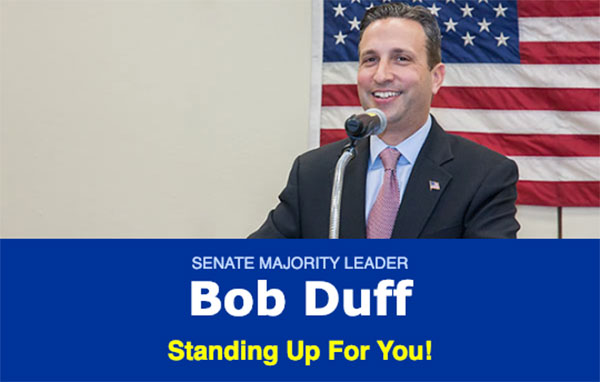Looney, Duff Condemn Utilities’ Attempt to Silence, Intimidate Officials
HARTFORD – Today, Senate President Martin M. Looney (D-New Haven) and Senate Majority Leader Bob Duff (D-Norwalk) issued a statement condemning recent efforts by state utility companies to effectively silence and intimidate State Senator Norm Needleman (D-Essex), as well as recent letters sent from Eversource executives to municipal leaders seeking their preliminary support for future “investments,” meaning rate increases, in coming months.
Senators Looney and Duff are extremely concerned about the severity and directness of these recent communications, especially amid an environment in which many utility customers in Connecticut saw significant spikes in cost over the summer of 2024, as well as the rhetoric at least one company is using regarding reducing services despite seeking rate increases from ratepayers.
“Senator Needleman receiving these letters is unusual, to say the least, and is indicative of a continued campaign from state utilities disturbed by the prospect of tougher regulations on their business and greater demands for accountability. Instead of working alongside legislators to shore up the stability and efficiency of the state’s electric grid, the utilities are universally opposing any effort that could pull funds away from their shareholders and bottom lines. Let’s be frank: Connecticut utilities enjoyed 20 years of a virtually free and lightly regulated market, and during that time, state power costs spiked while emergency response faltered. Now that the focus is turning toward the best interests of ratepayers, and not exclusively shareholders, there’s a full-court press in place against any progress. It’s disappointing, and we hope that state residents are paying attention.”
In an editorial published in the Connecticut Mirror on January 6, Needleman reported that he received a letter from Connecticut utilities accusing him of defamatory speech while discussing their business operations, as well as a letter reprimanding him when he called for increased accountability for utilities during his re-election campaign in fall 2024.
On July 17, 2024, Avangrid Vice President, General Counsel and Secretary Kenna Hagan addressed a letter to Sen. Needleman insinuating legal action against him in response to comments he made regarding utilities’ efforts. The letter claims Sen. Needleman defamed United Illuminating by publicly stating that Connecticut utilities want current Public Utilities Regulatory Authority Chair Marissa Gillett fired.
On November 8, 2024, Eversource’s President of Connecticut Electric Operations, Steve Sullivan, addressed a letter to Sen. Needleman shortly after his re-election. In that letter, Sullivan said Needleman’s mention of his efforts to reduce energy bills in a campaign flyer allegedly threatened the safety of Eversource employees, despite his messaging being focused on company decisions. Sullivan accused Needleman of trying to “provoke” constituents and accused him of “bullying.”
Despite these letters directly seeking to chill Sen. Needleman’s public statements, Sullivan then noted that legislators and utilities “need to work collaboratively” to solve complex energy challenges in the state.
On December 30, 2024, Sen. Needleman then received a letter from Eversource executives addressed to municipal leaders in his role as First Selectman of Essex. In response to the letter, which indirectly sought the support of municipal executives for future rate increases, Sen. Needleman issued his own letter to municipal leaders, responding to Eversource’s claims of needing to reduce its investments in state infrastructure by noting it has not filed for a rate decision since 2018, meaning such a decision is based off expectations of sharpened regulations instead of concrete evidence.
“Despite their recent insinuations that the walls are caving in financially,” Needleman wrote, “Connecticut utilities are still seeing record earnings, an 82% increase in the dividend payouts to shareholders over the last 10 years and record salaries for top CEOs.” He added that Eversource also recently experienced $2.4 billion in write-offs after failed financial investments.
The letters in question can be accessed here and here.
|
|
|

